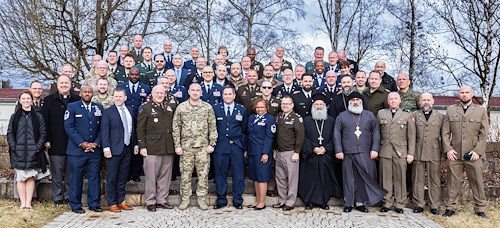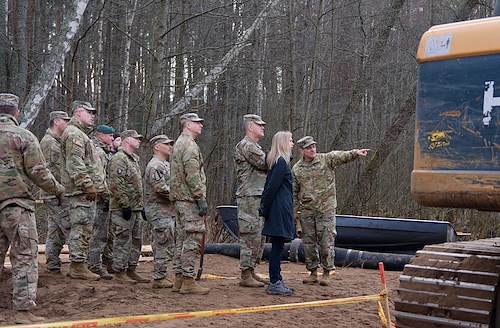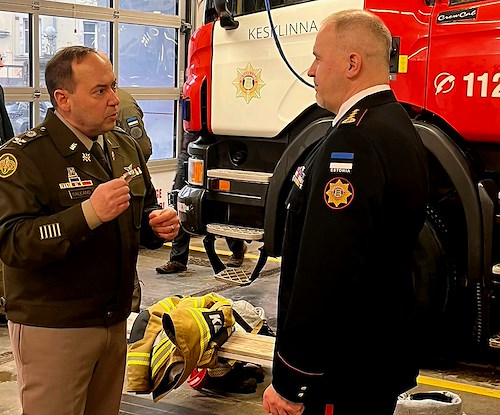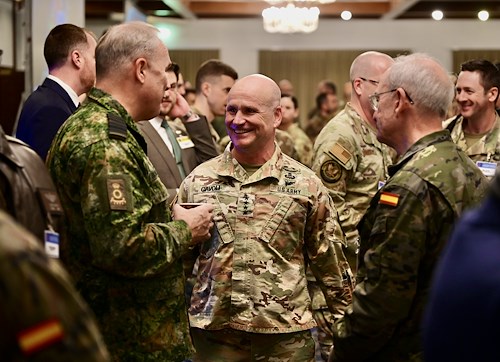Gallery contains 2 images
×
Photo 1 of 2
Military chaplains meet for 35th annual international conference
Sixty-five military chaplains and special guests from 13 NATO Ally and partner nations met at the U.S. European Command headquarters in Stuttgart, Germany, Feb. 6-8, 2024, for the 35th iteration of the International Military Chiefs of Chaplains Conference. During the conference, participants shared information, identified training needs and areas of cooperation, and updated future engagement plans. (U.S. Army photo by Chuck Prichard)
Photo by: U.S. European Command Public Affairs
Photo 2 of 2
Military chaplains meet for 35th annual international conference
Rehman Chishti, a British member of parliament and former prime minister’s special envoy for freedom of religion or belief, delivers the keynote address for the the International Military Chiefs of Chaplains Conference Feb. 8, 2024, at U.S. European Command headquarters in Stuttgart, Germany. Sixty-five military chaplains and special guests from 13 NATO Ally and partner nations attended the conference, held Feb. 6-8. During the event, participants shared information, identified training needs and areas of cooperation, and updated future engagement plans. (U.S. Army photo by Chuck Prichard)
Photo by: U.S. European Command Public Affairs
Sixty-five military chaplains and special guests from 13 NATO Ally and partner nations met this week at the U.S. European Command headquarters for the 35th iteration of the International Military Chiefs of Chaplains Conference.
U.S. Air Force Maj. Gen. Daniel Lasica, USEUCOM plans, policy, strategy and capabilities director, praised the work of chaplains of all faiths during his welcoming remarks to the group.
“Your wisdom, perspective and historical foundation bring stability and hope to the collective ranks of our personnel who face many challenges in the global security environment,” Lasica said. “The international chaplain corps is instrumental in striking the balance between mission and people that makes us all stronger together.”
The IMCCC began in 1990, when the USEUCOM chaplain’s office coordinated the first ever meeting of the senior military chaplains of NATO nations to discuss working together for the common good of those who suffer during combat. Through the years, the scope of the IMCCC has expanded. Today, the group serves to accelerate opportunities for religious affairs interoperability; strengthen international relations via religious key leader engagements; improve warfighter and family readiness and resiliency by advancing spiritual care; enable higher quality advisement to commanders on the impact of religion in theater; and promote international religious freedom and freedom of belief.
This year’s three-day conference was co-hosted by USEUCOM, the National Guard Bureau Office of the Joint Chaplain, and the Religious Freedom Institute. Delegates divided into working groups to share information, identify training needs and areas cooperation, and update their future engagement plans. Experts from the USEUCOM staff briefed attendees on topics such as security cooperation and strategic competition. The agenda also highlighted the role of chaplains in the DoD State Partnership Program (SPP), which partners National Guard forces from the United States with militaries around the world.
Rehman Chishti, a British member of parliament and former prime minister’s special envoy for freedom of religion or belief, delivered the event’s keynote address. He quoted research studies that indicate that the majority of the world’s population identifies with some sort of religion or belief system. He also provided examples of groups that commit acts of terrorism in the name of various religious causes.
“Military chaplains provide commanders with a vital connection to the faith leaders within the communities and offer a counter to the narrative of hate spread by these non-state actors,” Chishti said. “The work conducted by military chaplains is crucial to helping commanders understand the significant roles that religion, culture and tradition play in the operational environment.”
USEUCOM Command Chaplain U.S. Air Force Col. Christopher LaPack said the IMCCC is an important forum for Europe’s military religious leaders to share ideas and practices that support the collective security mission.
“Strategic religious affairs strengthen capabilities between militaries because our cooperation and potential interoperability has a direct positive impact on the readiness and spiritual resiliency of our warfighters and their families,” LaPack said. “The IMCCC is the largest annual gathering of international military religious leaders. It builds those relationships required to provide higher quality advisement to commanders on the complexities of religion regarding personnel and mission.”










